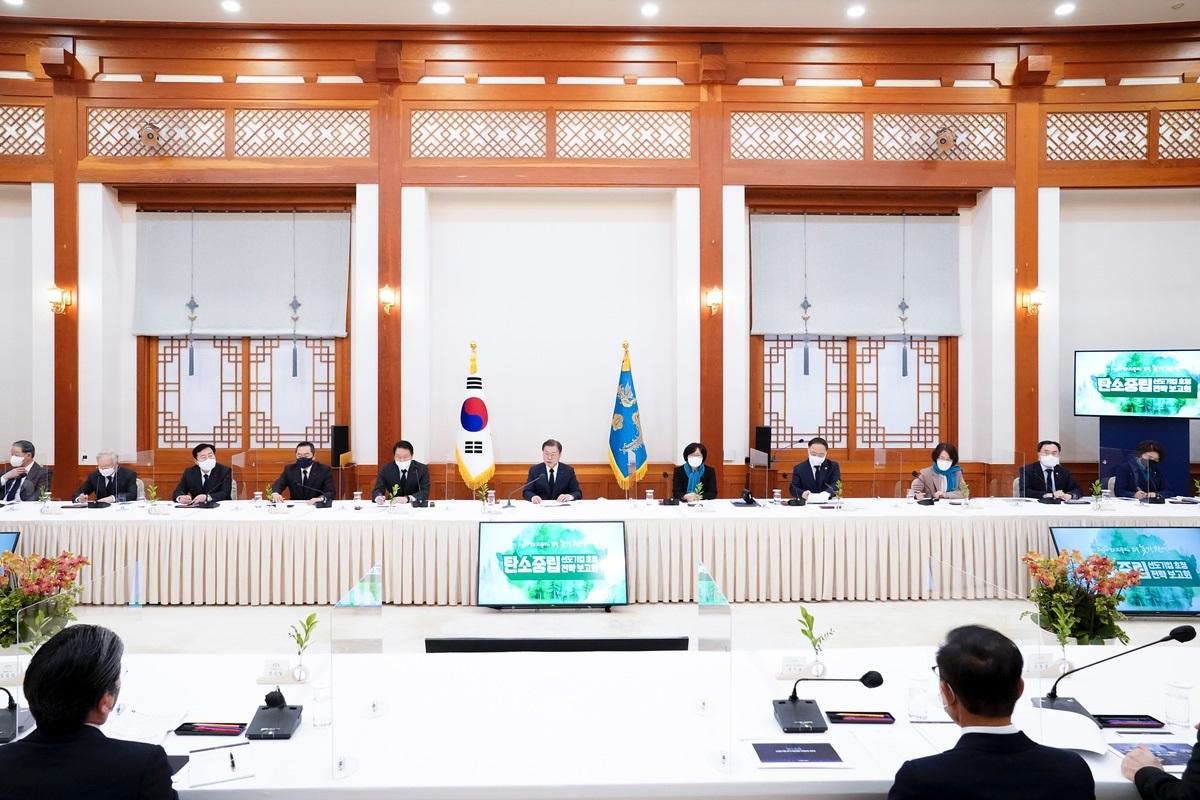[Jan] Korea to speed up efforts for energy transition under 2050 carbon neutrality goal
Date Jan 24, 2022
 President Moon Jae-in speaks during a meeting with business leaders at Cheong Wa Dae on Dec. 10, 2021 to mark the first anniversary of the 2050 carbon neutrality vision. Courtesy of Cheong Wa Dae
President Moon Jae-in speaks during a meeting with business leaders at Cheong Wa Dae on Dec. 10, 2021 to mark the first anniversary of the 2050 carbon neutrality vision. Courtesy of Cheong Wa Dae
Korea will accelerate efforts in 2022 to reach carbon neutrality, with the Ministry of Trade, Industry and Energy mapping out an action plan for the transition to renewable energy.
The government-led green campaign is part of the "2050 Carbon Neutrality Vision" declared by President Moon Jae-in in 2020.
The vision is aimed at setting an example and displaying leadership globally by meeting toughened goals worldwide to cut carbon emissions to zero by 2050.
It accordingly calls for a blueprint to foster three sectors – renewables, hydrogen and energy-related IT – as well as for expanded support by the government to ensure that no industries lag behind when going carbon neutral, especially energy-intensive ones like steel and petrochemicals.
To mark the Carbon Neutrality Vision’s first anniversary, President Moon reaffirmed the government’s commitment to the 2050 goal in a celebration, saying that it is for Korea’s posterity.
The President further noted that Korea should not be caught outside of high-carbon barriers, and thus should pursue a path toward markets centered on low-carbon products.
The Energy Ministry’s plan this year focuses on setting legal standards for the production and supply of renewables; nurturing core technologies to heavily cut greenhouse gas emissions; providing support for small and medium-sized enterprises (SMEs), rural communities and other groups that find it difficult to cope with enhanced green goals on their own; and keeping the next growth engines fully on track.
The government will seek to introduce more efficient licensing systems for the fast distribution of such renewables as solar and wind power, while ensuring the reinforcement of infrastructure to maintain the supply of traditional fuel sources for energy security.
The government will also work with relevant industries to replace coal-based energy with cleaner power and phase out aging coal power plants, while convincing coal plant operators to choose cleaner forms of energy.
It will push for the speedy commercialization of technologies that can allow us to capitalize on such substances as ammonia and hydrogen in new ways.
Concerning support for SMEs and rural communities, the ministry said “tailored support" will be offered, such as tax incentives.
The government designated electric vehicles (EVs), semiconductors, bioscience and rechargeable batteries as fields that will be essential for the country to maintain growth in the net-zero era. They will be considered as strategic industries related to national security and therefore will receive relevant support.
**If you have any questions about this article, feel free to contact us at kocis@korea.kr.**

The Ministry of Culture, Sports and Tourism's "Korea Here & Now" work can be used under the condition of "Public Nuri Type 1 (Source Indication)."




